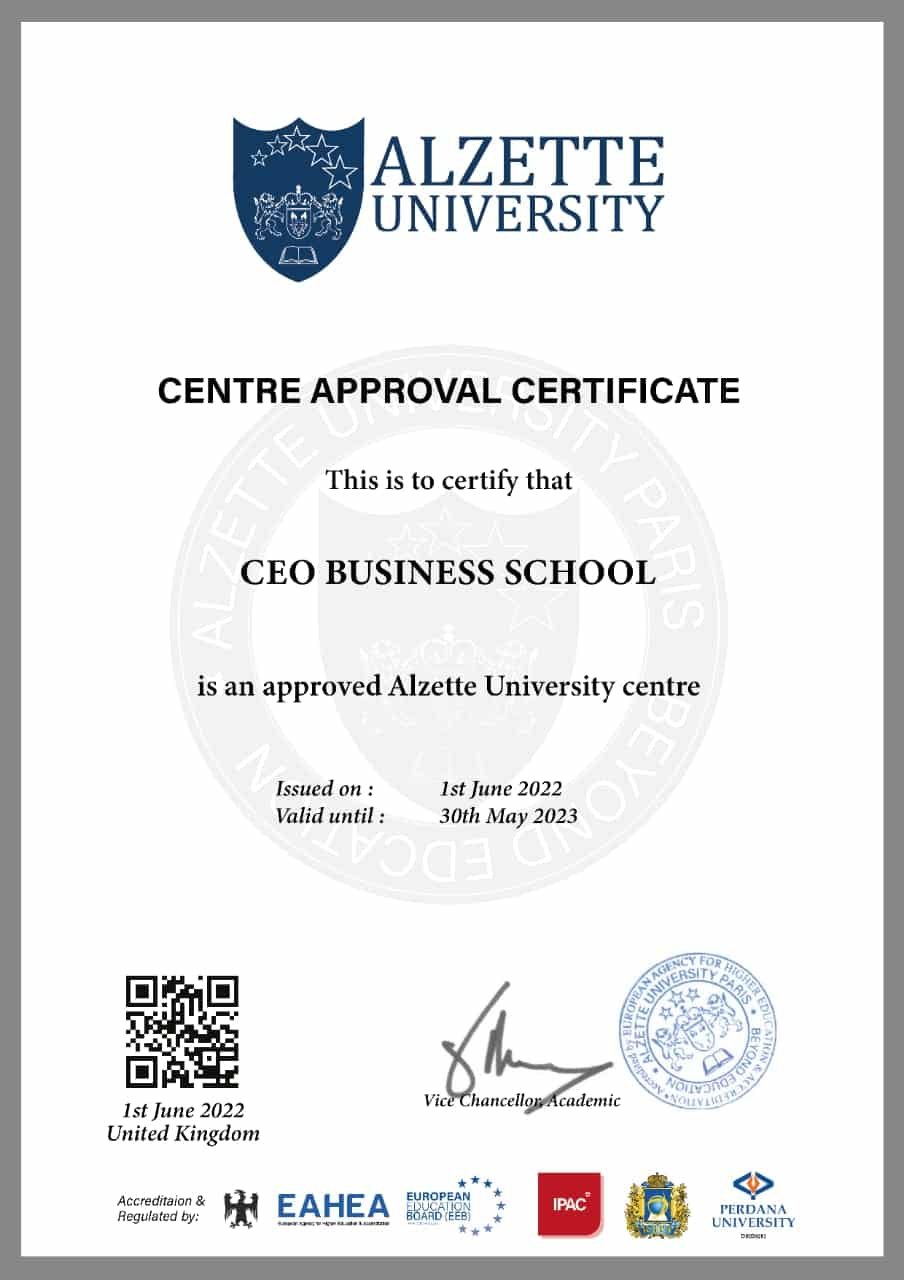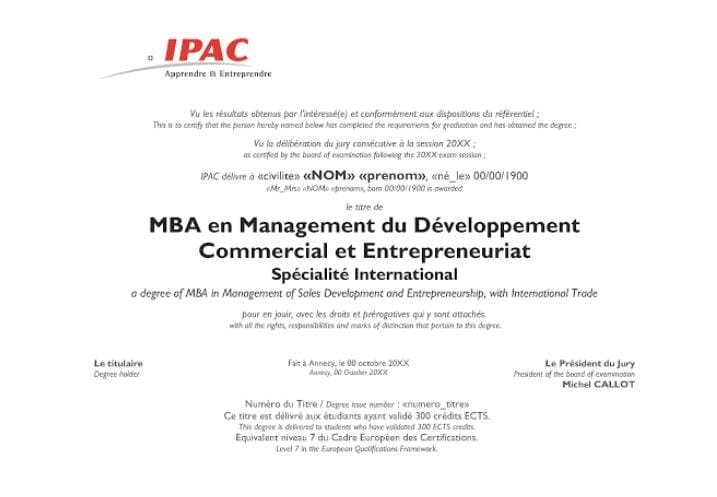ALZETTE University
ALZETTE UNIVERSITY
Alzette University is the latest gateway of study campus around Europe, Middle East and Asia that provides on-site blended learning.

ABOUT ALZETTE
“Globally innovating education through lifelong learning experiences to inspire a community of unique and extraordinary individuals.
Our programs at Alzette University (AU) are designed to inspire people from all over through excellence and quality education”.
Modules
Description
This course aims to provide participants with the knowledge of the concepts and language
of strategic management and planning. It involves the aspects of organisational behaviour,
development and responses to environmental changes that are concerned with gaining the
competitive edge for the long-term survival of the organisation. The focus is on the
development of holistic thinking and competencies in crafting sustainable corporate
strategy organizations. In addition, this course covers the essential elements of leadership,
understanding a leader’s role in leading and crafting corporate strategy in the global context
as well as the diversity in leaders.
Objective / Outcome
1. explain personal strategy, business strategy and corporate strategy.
2. relate personal strategy to corporate strategy.
3. elaborate the importance of the name of the organisation.
4. discuss the significance of vision statements including its pillars and purpose.
5. discuss the importance of matching between corporate vision and corporate strategy.
6. explain the causes of being unethical.
Outlines
1-Intro to CSL
2-Formation of Organization
3-Internal Environmental Audit
4-External Environmental Audit
5-Competitive Dynamism Market Attractiveness
6-Entry Exit Strategy
7-Designing Managing Portfolio Organization
8-Ethics in Crafting CSL
9-Leadership Behavior in Corporate Level
10-Decision Making Empowerment by Leader
11-Strategic Leadership in Organization
12-Developing Leadership Skills
Description
- This course is designed to take graduates from any discipline into careers in marketing management.
- We don’t just teach the theory of marketing. There’s a lot of emphasis on applying what you learn in a business setting.
- You can also apply to do a company-based dissertation, working with an external organization. Recent dissertation projects include a branding review for a large law firm and working with a local, environment-led SME to study consumer behavior.
Objective / Outcome
This course addresses how to design and implement the best combination of marketing
efforts to carry out a firm’s strategy in its target markets. Specifically, this course seeks to
develop the student’s
(1) understanding of how the firm can benefit by creating and
delivering value to its customers, and stakeholders, and
(2) skills in applying the analytical
concepts and tools of marketing to such decisions as segmentation and targeting, branding,
pricing, distribution, and promotion. The course uses lectures and case discussions, case
write-ups, student presentations, and a comprehensive final examination to achieve these
objectives. Course Objectives:
1. To familiarize with the basic concepts, and techniques of marketing management.
2. To understand the behaviour of consumers
3. To create awareness of marketing mix elements.
4. To analyze and solve marketing problems in the complex and fast changing business
environment.
Outlines
1-Marketing Concepts and Creating Value
2 – Strategic Marketing
3 – The Marketing Environment
4 – Marketing Research
5 – Consumer Behaviour
6 – Brand Branding, Brand Equity and Brand Positioning
8 – Dealing with Competition
9 – Product and Services Strategy
10 – Pricing Strategy
11 – Distribution Strategy
Description
Strategic financial management is a term used to describe the process of managing the finances of a company to meet its strategic goals. It is a management approach that uses different techniques and financial tools to devise a strategic plan. Strategic financial management ensures that the strategy chosen is implemented to achieve the desired goals.
Objective / Outcome
- Realize the importance and relevance of the ever-changing nature of finance
- Learn the financial tools and techniques that help firms to maximize value by improving decisions
- Know budgeting techniques, procedures for determining the capital structure and various aspects of working
Outlines
1-Overview of strategic financial management
A-Goals Of strategic financial management
B-Profitability and risk exposure Short-term and long-term financial instrument
2. Leverage and Capital Structure
A-Operating & Financial leverage
B-Total leverage
C-Concepts of capital structure
D-The total-Value concept
E-Taxes and market imperfection
3-Working Capital Policy
A-Working capital issues
B-Financial current assets(Short term & Long term)Combining Liability structure and current assets decision
4. Short Term Financing
A-Spontaneous financing
B-Negotiated financing
C-Composition of short-term financing
5-Account Receivable And Inventory Management
A-Credit and collection policies
B-Analyzing credit applicant
C-Inventory management and control
6-Dividend Policy
A-Passive & Active dividend policies
B-Factors Affecting dividend policies
C-Stocks dividends and stocks split Dividend stability
7-Valuation of Securities
A-Distinctions among valuation concept
B-Bond valuation
C-Common stock and Preferred stock Valuation
D-Rate of return
8-Hybrid Financing
A-Preferred Stock
Description
Manages the accounting staff who are responsible for financial reporting, billing, collections, payroll, and budget preparation. Recruits and hires accounting and financial staff and conducts performance evaluations. Coordinates training programs for new staff and identifies training needs for current staff.
Objective / Outcome
Possess knowledge of and be ready to perform basic functions of bookkeeping/accounting procedures and duties as required in the entry-level bookkeeping/accounting positions, for example:
- Assistant bookkeeper/accountant
- Accounting trainee
- Business owner
- Demonstrate proficiency in using accounting computer software (e.g., Peachtree and QuickBooks) to do basic bookkeeping/accounting and prepare basic accounting reports.
- Be prepared to pursue opportunities for professional development, career change, and pursuance of associate and higher degrees in accounting or related disciplines.
Outlines
1-Describe and adopt a processual and dynamic view of organisations.
2-. Understand the importance of accurate costing, and apply different costing techniques and systems to achieve this aim
3-Explain how management accounting technologies can be used to constructively drive and support
process improvement in order to reduce cost, reduce time, improve quality, and support innovation.
4-Identify, evaluate, and utilise relevant management accounting information in making various
operational, investment, and pricing decisions.
5-Recognise how management control systems can influence behaviour, and apply this knowledge in
designing performance measurement systems and incentive packages that motivate the achievement of organisational goals.
6- Appreciate how the technical and social contexts of organisations affect value generatio
7- Learn independently and assume responsibility for your learning process.
8-Demonstrate an understanding of the organisational context and a tolerance for ambiguity when applying knowledge and problem-solving skills to specific cases.
Description
- This course aims to provide students with an understanding of the nature of enterprise and entrepreneurship and introduces the role of the entrepreneur, innovation and technology in the entrepreneurial process.
- It is not about small business or life style businesses but instead the development of growth oriented businesses – whether for-profit or not-for-profit.
- Entrepreneurship is both a way of thinking and of doing.
- It involves “building something from nothing” and successful entrepreneurs know how to manage and mitigate uncertainty and risk.
- The course content is relevant to those individuals thinking about starting a business or who are already in business – large or small, those who are interested in commercialising their own innovations or of others, and those who advise entrepreneurs or engage in policy making in the entrepreneurship area.
Objective / Outcome
1. understand why entrepreneurship is driving innovation and new ventures – in both the startup economy and the corporation
2. understand the different types of disruption – small scale to large
3. impart an understanding of the key characteristics of successful entrepreneurs and ventures – both startup entrepreneurship and corporate entrepreneurship
4. inspire participants to establish or understand ventures, based on a realistic view of the benefits and trade-offs
5. impart skills in identifying and evaluating opportunities, developing strategies for growth and securing the resources required
6. learn directly from successful entrepreneurs about the issues they confronted, approaches they took and how they managed the consequences
7. understand and have practical experience in current innovation strategies
8. understand the barriers and drivers of innovation
9. understand how innovation can be applied within the corporation
10. go through the steps of defining and building a startup
11. understand how experiments are defined and tested in the marketplace
12. define a pitch and present to a panel of investors
13. understand why entrepreneurial thinking is important in the corporate world.
Outlines
On successful completion of this course, students will be able to:
1-Discuss the attitudes, values, characteristics, behavior, and processes associated with possessing an entrepreneurial mindset and engaging in successful appropriate entrepreneurial behavior.
2-Discuss what is meant by entrepreneurship and innovation from both a theoretical and practical perspective, and the role of the entrepreneur in the new enterprise creation process.
3-Describe the ways in which entrepreneurs perceive opportunity, manage risk, organize resources, and add value.
4-Develop a plan for implementing entrepreneurial activities in a globalized and competitive environment is responsible for social, ethical, and cultural issues.
5-Critique a plan for implementing entrepreneurial activities in a globalized and competitive environment being mindful of the social, ethical, and cultural issues.
6-Engage in a continuing learning process through the interaction with peers in related topics, as individuals and as team members.
Description
- This course aims to provide students with an understanding of the nature of enterprise and entrepreneurship and introduces the role of the entrepreneur, innovation and technology in the entrepreneurial process. It is not about small business or life style businesses but instead the development of growth oriented businesses – whether for-profit or not-for-profit. Entrepreneurship is both a way of thinking and of doing. It involves “building something from nothing” and successful entrepreneurs know how to manage and mitigate uncertainty and risk. The course content is relevant to those individuals thinking about starting a business or who are already in business – large or small, those who are interested in commercialising their own innovations or of others, and those who advise entrepreneurs or engage in policy making in the entrepreneurship area.
Objective / Outcome
1. understand why entrepreneurship is driving innovation and new ventures – in both the startup economy and the corporation
2. understand the different types of disruption – small scale to large
3. impart an understanding of the key characteristics of successful entrepreneurs and ventures – both startup entrepreneurship and corporate entrepreneurship
4. inspire participants to establish or understand ventures, based on a realistic view of the benefits and trade-offs
5. impart skills in identifying and evaluating opportunities, developing strategies for growth and securing the resources required
6. learn directly from successful entrepreneurs about the issues they confronted, approaches they took and how they managed the consequences
7. understand and have practical experience in current innovation strategies
8. understand the barriers and drivers of innovation
9. understand how innovation can be applied within the corporation
10. go through the steps of defining and building a startup
11. understand how experiments are defined and tested in the marketplace
12. define a pitch and present to a panel of investors
13. understand why entrepreneurial thinking is important in the corporate world.
Outlines
On successful completion of this course, students will be able to:
1 Discuss the attitudes, values, characteristics, behavior, and processes associated with possessing an entrepreneurial mindset and engaging in successful appropriate entrepreneurial behavior.
2 Discuss what is meant by entrepreneurship and innovation from both a theoretical and practical perspective, and the role of the entrepreneur in the new enterprise creation process.
3 Describe the ways in which entrepreneurs perceive opportunity, manage risk, organise resources and add value.
4 Develop a plan for implementing entrepreneurial activities in a globalised and competitive environment being responsible for the social, ethical and culture issues.
5 Critique a plan for implementing entrepreneurial activities in a globalised and competitive environment being mindful of the social, ethical and culture issues.
6 Engage in a continuing learning process through the interaction with peers in related topics, as individuals and as team members.
Description
This course addresses topics of how economic environment affects business decisions. It covers the core knowledge of economics for business in order to better manage scarce resources for sustainability. It is a highly practical course that explains the use of economic and non-economic information in the business context. The course also enhances skills in analyzing and interpreting economic information in the context of the organization,its competitors and industry.
Objective / Outcome
Assess the implications of economic policies and trends on business firms and related industry. Employ evidence from literature to evaluate the relevant causes and effects related to government policies in Asian Economics. Demonstrate effective communication on managerial economics issues to relevant stakeholders. Integrate ethics in analysing economics matters in making business decisions.
Outlines
UNIT 01 -Introduction to the Course Course Outline Course Guide Introduction to Managerial Decision Making The Economics of a Business An Overview of Important Economic Terms and Concepts
UNIT 02- Supply and Demand
UNIT 03- Market Demand
UNIT 04- Market Supply
UNIT 05- Market Equilibrium The Firm and Its Goals
UNIT 06- The Economic Goals of A Firm
UNIT 07- Maximizing the Wealth of Shareholders
UNIT 08- Economic Profits Empirical Methods for Demand Analysis
UNIT 09- The Economic Concept of Elasticity, Elasticity Measures, Elasticity of Supply” Consumer Choice: Demand Estimation and Forecasting
UNIT 10- Regression Analysis, Regression Analysis in Economic Research Forecasting Techniques Production and costs in economics The Theory and Estimation of Production
Description
This course aims to provide participants with an understanding of the legal environment within which the Malaysian business operates by giving them an exposure to the various laws that govern formation and performance of business contracts, operation of negotiable instruments and organizations like partnership firms and companies. In addition, this course provides participants with understanding of the developments in governance requirements that have unfolded as a result of the shift from a controlled to market driven economy. Furthermore, participants are equipped with the principles and practices of ethical conduct which they can apply to their decision making.
Objective / Outcome
1. Interpret the roles and importance of legal framework provided by the business laws in Malaysia in leading an organization.
2. Apply knowledge in law of contract, partnership law, agency law, company law, consumer protection law, employment law, legal provision of copyright and Cyberlaw to address business issues and related managerial decisions.
3. Examine the principal elements that constitute corporate governance frameworks across various level of the organisation by proposing the possible legal outcomes and appropriate solutions arising from legal disputes in business operations.
4. Integrate ethical principles and practices in all aspects of managerial decisions.
Outlines
UNIT 01-Introduction to the Course Course Outline Course Guide Business Law, Ethics and Governance in Business” Introduction to Business Law, Contract Law and Sale of Goods
UNIT 02-Understanding Law and Malaysian Legal System
UNIT 03-Law of Contracts
UNIT 04-Sale of Goods Act” “Commercial Laws
UNIT 05-Agency – Part X of Contracts Act 1950
UNIT 06-Insurance
UNIT 07-Negotiable Instruments” “Company Law and Partnership Law
UNIT 08- Company Law
UNIT 09-Partnership Law”
UNIT 10-Employment Law, Consumer Protection Act and Alternative Methods of Dispute Resolution,Employment Law Consumer Protection Act
Description
This course emphasizes the value and process of strategic management. In addition to familiarizing students with new subject matter, students are expected to integrate and apply their prior learning to strategic decision making in organisations. The Strategic Management course is designed to explore an organisation’s vision, mission, examine principles, techniques and models of organisational and environmental analysis, discuss the theory and practice of strategy formulation and implementation such as corporate governance and business ethics for the development of effective strategic leadership.
Objective / Outcome
1. Integrating the knowledge gained in functional areas of management.
2. Creating awareness regarding corporate governance and social corporate responsibility.
3. Helping the students to learn about the process of strategic management.
4. Helping the students to learn about strategy formulation and implementation.
Outlines
Unit 01 – Introduction to Strategy
Unit 02 – Strategic Capability
Unit 03 – Strategic Purpose
Unit 04 – Culture and Strategy
Unit 05 – Business Strategy
Unit 06 – Corporate Strategy and Diversification
Unit 07 – International Strategy
Unit 08 – Innovation and Entrepreneurship
Unit 09 – Mergers and Acquisitions
Unit 10 – Strategy Development Process
Description
Candidates for completion of the Master of Business Administration (MBA) degree will complete an independent project demonstrating their conceptual, analytical, research, and practical management skills achieved through the courses in the program. The project, called a Capstone because it represents a crowning achievement much as a capstone does in architecture, is a 3-credit, one-term requirement that is completed at the end of the program. It is a closely supervised experience resulting in a paper that demonstrates the student’s ability to synthesize and utilize the skills and knowledge gained throughout the MBA program.
Objective / Outcome
1. Apply the knowledge in identifying business problems by conducting quantitative or qualitative research by presenting literature in a formal research report.
2. Develop research framework and design to explore various types of research to identify key characteristics to conceptualise the research
3. Design specific research methodology to address the research problem identified.
4. interpret the data using digital skills and provide justification and generalisability towards the research project to conclude the findings Course Topics
1. Preparation of a research proposal from problem statement to methodology.
2. Implementation of the methodology, including sample selection, collecting data, and completing an appropriate data analysis.
3. Drawing databased conclusions and recommendations that address the problem statement.
4. Presenting and defending the student’s research process, including findings, and recommendations.
Outlines
Unit 1: Preparing for the Research: From Proposal to Research Design
Unit 2: Conducting the Research: Data Collection and Analysis
Unit 3: Concluding the Research: From Conclusions/Recommendations to References and Appendices
Unit 4: Concluding the Capstone Project: From Revision to Presentation
Unit 5: Research Ethics and literature review
Unit 6: Conceptual framework and Design
Unit 7: Data Collection Methods and Analysis
Unit 8: Case study Research
Unit 9: Designing case study methods
Unit 10: Business
| MBA -IPAC | Start date |
|---|---|
| Strategic FINANCIAL MANAGEMENT | 19-Oct-2024 |
| Marketing Management in Practice | 23-Nov-2024 |
| Entrepreneurship and Innovation | 21-Dec-2024 |
| Managerial Economic | 18-Jan-2025 |
| Business Law | 15-Feb-2025 |
| International business | 15-Mar-2025 |
| Corporate Strategy and Leadership | 12-Apr-2025 |
| Strategic Management | 10-May-2025 |
This table is adjustable.




